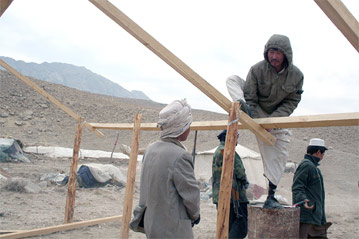South Asia earthquake update
South Asia earthquake update
A massive NATO/UNHCR airlift for earthquake victims in south Asia is now in its third day and has so far delivered more than 60 tonnes of UNHCR tents, blankets and other relief items to Pakistan. As of yesterday, seven sorties had been flown by NATO cargo aircraft carrying urgently needed supplies from UNHCR's emergency stockpiles in Turkey. Another five flights by French, British, Greek and Turkish air force cargo planes are scheduled to leave Incirlik airbase today. With help from the Turkish government, the joint NATO/UNHCR airlift is rushing a total of 860 tonnes of UNHCR emergency materials over the next several days, using military aircraft from many NATO member states.
Separately, UNHCR has itself sent 10 additional planeloads of supplies to Pakistan from our stockpiles in Copenhagen, Dubai and Jordan. The UNHCR airlift from Jordan is continuing.
By the end of next week we expect to have delivered from our emergency stockpiles around the world more than 15,000 family tents, 220,000 blankets, 68,794 plastic sheets, 500 plastic rolls, 31,840 kitchen sets, 2,000 stoves and 5,000 lanterns.
A senior team from Geneva headquarters arrives today in Islamabad on a five-day mission to review our emergency response to date. UNHCR has 11 offices in Pakistan. On the ground, UNHCR aid supplies are being distributed from our existing warehouses in Pakistan and neighbouring Afghanistan to affected areas to help meet some of the massive needs of an estimated 3 million people. Today, a UNHCR convoy from our Peshawar warehouse will deliver 800 family tents, 1,600 plastic sheets, 2,400 blankets and 800 jerry cans to Muzaffarabad.
UNHCR emergency teams - including experts in camp planning - have been deployed to five key locations in the north of Pakistan (Mansehra, Balakot, Batagram, Bagh and Muzaffarabad) to help with aid distribution and the establishment of temporary camps. The Pakistan government has asked UNHCR to help set up temporary camps for the displaced. Two camps near Balakot - Bassian and Ghari Habibullah - have so far been established for families coming down from their villages in the nearby mountains. More than 850 UNHCR family tents were distributed to the Pakistan army and have been erected in the two camps. More are on the way. Many earthquake victims are coming down from their mountain villages to collect relief items to take back home. It's likely many more people will come down from their villages as winter sets in, and many will remain in the valleys. So establishment of temporary camps is urgent. UNHCR is working with NGOs like International Medical Corps and Social Sustainable Development to ensure water, sanitation and basic health care in the camps.
More tents are being rushed to the region to expand the camps. The government plans to house 5,000 families in Bassian camp and 3,000 families in Ghari Habibullah. A third camp, in Batagram, for 5,000 families has also been planned. Three camp sites in Muzaffarabad have also been confirmed.
On Wednesday, five hundred UNHCR tents were airlifted by the American Refugee Committee to remote villages near Bagh, 1,900 metres above sea level. It had not received any assistance.
Like our other UN partners, UNHCR is in urgent need of funds for this operation. We need $22 million and have so far received only $4 million. We have already spent some $6 million.
It is essential that UNHCR maintains a certain level of preparedness for unforeseen emergencies, and we urgently need funds to replenish those supplies that have been rushed to Pakistan from our stockpiles worldwide. As this crisis demonstrates, tents are absolutely crucial in emergency response and our stocks are now getting very low. Pakistan companies have traditionally been one of our main suppliers of tents, but all of their production must now go to the earthquake victims. So we need to find additional suppliers elsewhere in the world to produce or provide more tents. UNHCR's procurement people are contacting possible suppliers in China.








